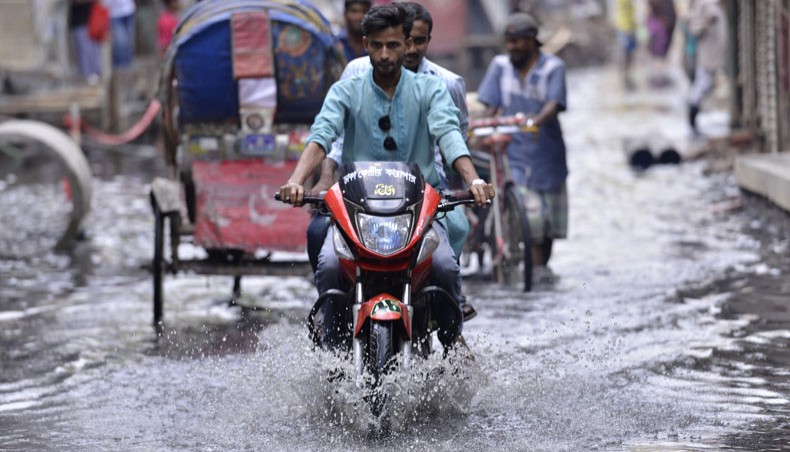SOLVING CAPITAL’S WATERLOGGING Decisions mostly not implemented
The capital’s inhabitants expressed fears that due to non-implementation of most of the decisions the government took last year to solve the perennial waterlogging problem would increase their plights with the advent of monsoon.
The decisions were taken on the basis of the recommendations urban experts had made after last year’s unprecedented waterlogging compelled commuters to rely on boats for moving within the capital.
Urban planners, architects and engineers expressed dismay over the authorities in indifference to implement the decisions.
They apprehend that public sufferings would multiply in the capital during the coming monsoon.
Widespread road digging, they said, created new problems for the capital.
No remedy is in sight, Bangladesh Institute of Planners vice-president and Urban and Regional Planning professor at Jahangirnagar University Akter Mahmud told New Age.
The failure to recover canals from the grabbers and drainage network’s interruptions at many points by construction activities would, he said, intensify the capital’s perennial waterlogging.
The capital’s authorities were least prepared to tackle what monsoon could do beginning next month, said Akter.
A local government, rural development and cooperatives ministry meeting chaired by LGRD minister Khandker Mosharraf Hossain in August 2017 had taken four key decisions for speedy drainage of 60-70 mm of rainfall within two to three hours to end the waterlogging.
Khandker Mosharraf assured the people that there would be no waterlogging from2018 onwards.
But none of the decisions, including assigning a single authority to manage the capital’s drainage could be implemented until now.
The decisions for activating box culverts for speedier drainage of rain waters and recovering the capital’s canals also remain unimplemented.
At a separate meeting at Dhaka North City Corporation, attended by Khandker Mosharraf and other concerned ministers, the two mayors and the chief of 26 government agencies in July 2017 took a number of decisions including vesting drainage management responsibilities on the city corporations by freeing DWasa from this task, but nothing happened since then.
The decision not to allow road digging after the advent of the rainy season also brought no visible results.
Abu Hanif of Dhanmondi said that waterlogging became a serious problem already though the monsoon was yet to begin.
He said that the others he finds high sounding promises as ‘only hollow assurances.’
The problem is common for all the neighbourhoods including Mirpur, Mohakhali, Magbazar, Malibag, Khilgaon, Jatrabari, Jurain, Azimpur, Motijheel, Gulistan and the old town.
DWasa took no effective move to recover 26 canals it is supposed to maintain.
Dhaka North City Corporation additional chief engineer Syed Qudratullah said that since DWasa in mandated to manage drainage the DNCC had nothing to do in his area.
Dhaka WASA managing director Taqsem A Khan said the waterlogging problem cannot be ended any time soon as there is no facilities to store rainwater.
He said Dhaka WASA began re-excavating 14 canals which could hold the rainwater before draining it out.
Architect Iqbal Habib said only implementation of drainage master plan, and not stop gap activities, could solve the capital’s acute waterlogging problem.
News Courtesy: www.newagebd.net











